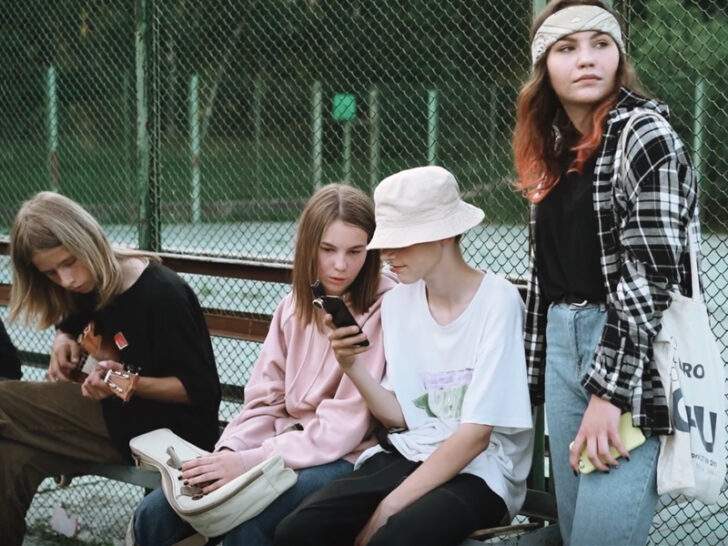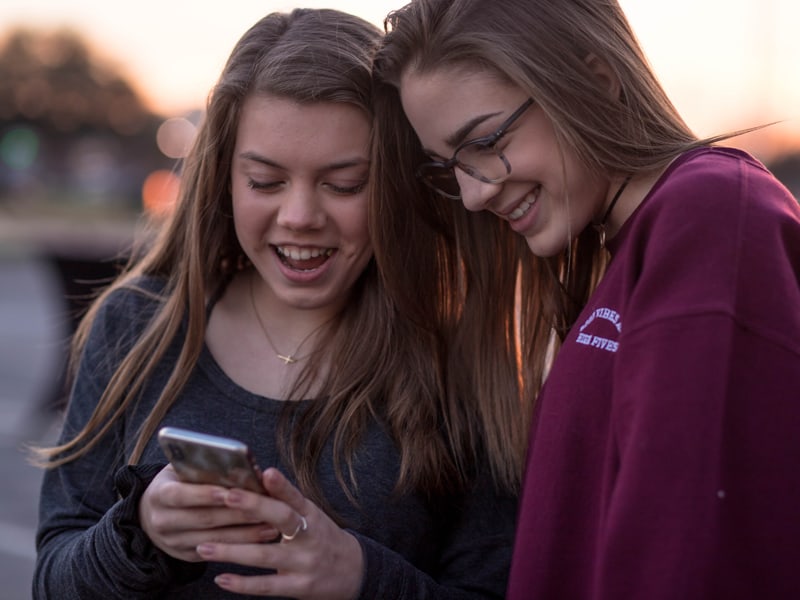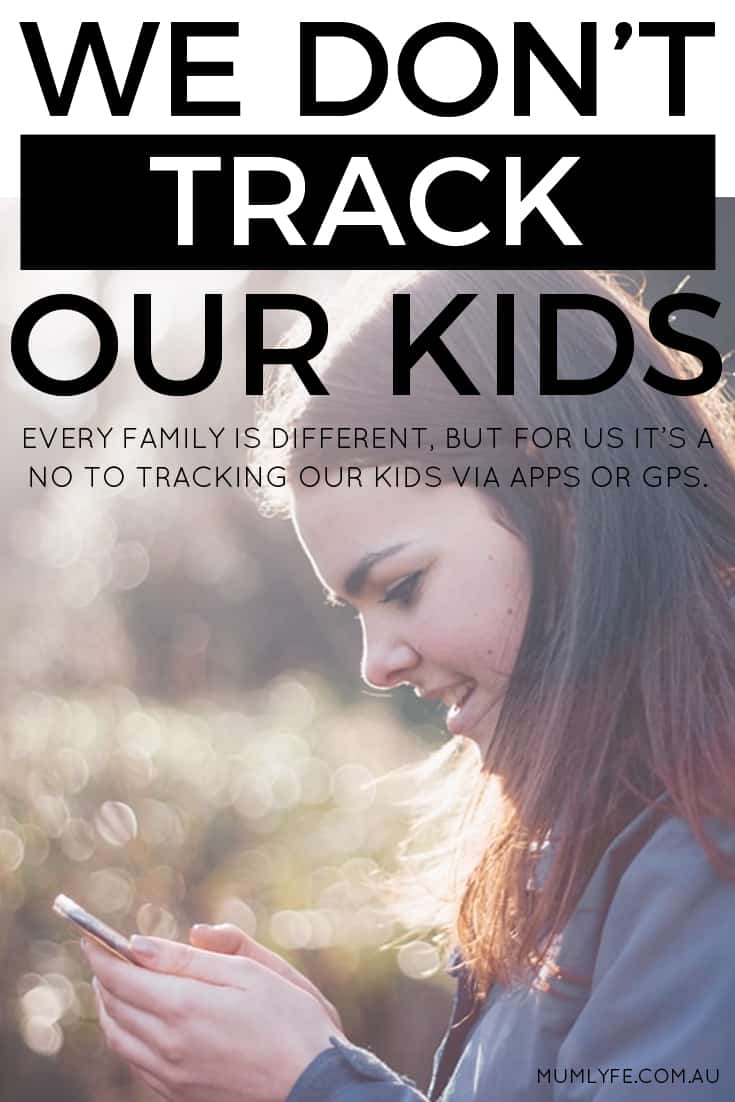It’s true, we don’t track our kids. There’s no GPS attached to their phones. We don’t use apps that pinpoint their location or limit their phone use or block certain sites. There are no parent blockers operating on our internet or apps turning off phones between certain times*. None of it, nothing.
* Unless put in place by the kids themselves.
There are lots of reasons for this, and I wanted to share some of them with you. It’s not because I’m trying to sway your own choices or judge the way you do things with your own kids. Every kid, every parent, every family, is different and we’ve all got to do what makes us feel the most comfortable and secure, based on our own experience. For example, I imagine that some of the tracking devices available would be a godsend for parents of special needs or at-risk children.
Not a ‘what if’ life
Before I go on, I also just want to take the ‘man in a white van’ off the table. We are free-range parents who don’t believe in living a ‘what if’ life.
We get that there are frightening people out there that do revolting things to children. We get that it might happen to our own children. We just choose not to live as if it’s an expected thing.
We’ve raised the kids to be as aware of these things as possible, and then we just get on with it. What could be seen as a cavalier attitude to this kind of danger isn’t for everyone, I understand. Just thought I’d clarify my base-point.
Privacy is a right
Okay, so the number one reason we don’t track our kids is privacy. It’s a really layered thing, when you think about it.
Firstly, I believe that kids have a right to decide if they are going to be truthful or not. They get to to lie if they want to about their screen usage, where they’ve been, what they’re looking at. I know we’ve raised them to value honesty, but I also know that they’re tweens and teens and they’re going to lie sometimes. We all do, especially when we’re young. But it’s their right to lie and face the consequences we set if they get found out.
Secret and lies
Next, privacy is also about getting to keep secrets if you want to, especially from your parents. While we encourage our kids to be open and they know they can talk to us about anything without judgement, it’s up to them to decide whether to share.
All the monitoring and tracking in the world isn’t going to change who they decide they want to be at any given time.
If my kids wanted to explore a porn site, it’s up to them if they choose to tell me. “If you stumble over anything on the internet that is confusing or confronting, just come and see me and I’ll try to explain.”
This too: We need to start talking to tweens about the risks of porn
They know what our stance is on things like porn, violence, bullying, general online nastiness. They know why we feel the way we do and why we’d like them to agree with us. The rest is up to them.
5 more reasons why we don’t track our kids
It’s not just about valuing the kids privacy, either. There are other, equally important, reasons for going easy on the monitoring. Here’s a quick rundown:
1. Talk when they’ll still listen
All three kids have found something they wanted to talk about at some stage – of course they have.
Every single time, I’ve realised that it’s a conversation that I’m glad we got to have sooner rather than later, if at all.
I’d much rather my kids came and talked to me about porn/violence/bulling/sex at an age where they still valued my insight and advice. That way, they get to talk about it for the first time with their parents, not their peers.
This helps: The daily kid check-in
And the #1 reason why older kids talk to their parents about awkward things is that they trust them.
2. Building trust not walls
Respecting privacy goes a long way to building trust. Sure, I get that trust can be broken at any time, and kids do it all the time. Building trust takes a lot of effort and time, but what it doesn’t stick to is an uneven surface.
If we want to be able to trust our kids, they have to be able to trust us too. There’s nothing about monitoring and tracking that proves trust to me. We will always their safe space to be completely themselves, and that includes when they are online or out and about. Reason enough that we don’t track our kids.
3. Phones go flat, but instincts get sharper
We don’t want the kids growing up thinking that we’re ever-present, able to fly in and rescue them at any given moment. I know that sounds weird, given that in my heart that’s exactly what I want to do. But we know we’re doing them no favours by taking away the need for them to develop street smarts.
Having a phone with you is enough. Be observant, trust your gut, think through solutions in advance, be confident that you can do what’s needed.
4. It’s about them, not us
Tracking our kids whereabouts and online life means they know there’s always someone waiting to judge their behaviour. We’d rather they learn to look inward to figure out if something is right or wrong.
How does it make them feel when they do something they shouldn’t? What do they think of the conversations they see online? How do they feel about their own conduct? Are they proud of the pictures they post?
Learning self-monitoring: Our #1 rule for our kids’ smartphone use
5. We learn by doing
I get that our kids’ brains aren’t fully developed and that does worry me. It’s hard enough navigating life with a fully-formed cortex. Yet we understand that the only way to truly learn is by doing.
Kids can listen to all the advice, lectures and nags you like (or don’t listen, they probably won’t), but only real-life action and consequences will change behaviour. Through things like monitoring and tracking, we want to swoop in and save them from making mistakes, but that’s not going to happen. Even if it did, it’s not always the best way to help them develop into resilient, confident, independent adults.
Who they want to be
I deeply hope that we’ve done the work to prepare our kids for the path, but I know they’re each going to stuff up at some stage. Probably at many stages.
Yet we still don’t track our kids because all the monitoring in the world isn’t going to change who they decide they want to be at any given time. It only fuels anxiety by making us think that we can control what happens to our kids when we just can’t. It’s not going to help me sleep better at night knowing more of their business than I ought to.
What does help me sleep better is knowing that we’ve raised kids who trust us and know they can come to us and we’ll be there. There’s no need for them to spend their time trying to sneak around our observation tower. They can walk out any time they want to, always knowing they can always walk straight back in again.
Feature by Corinne Kutz; two girls by Blake Barlow; by Luke Porter




